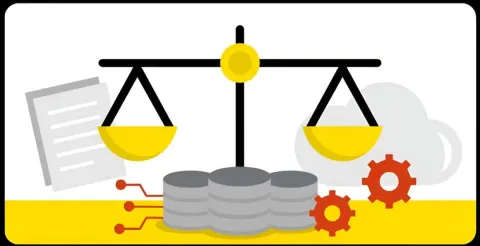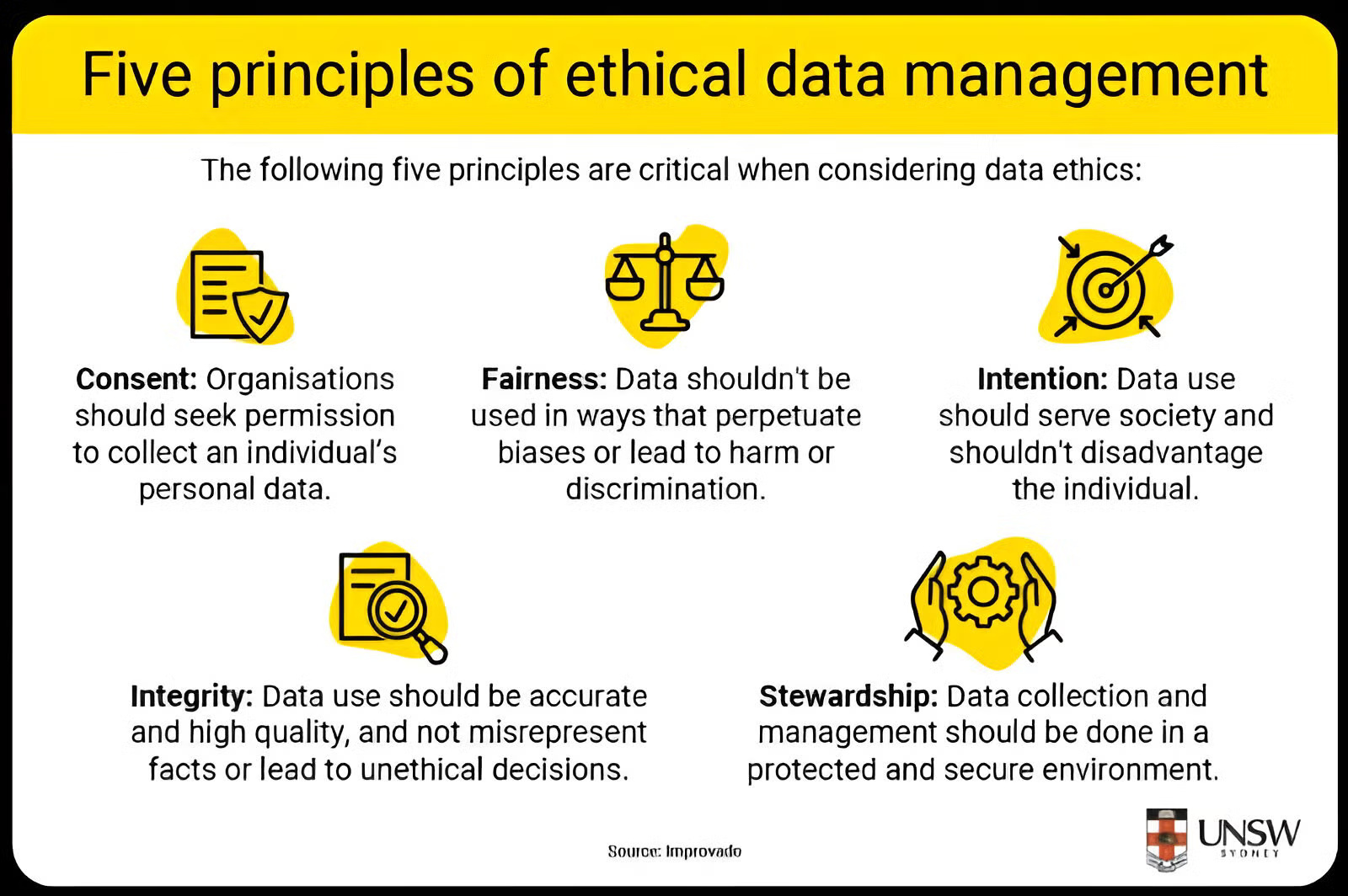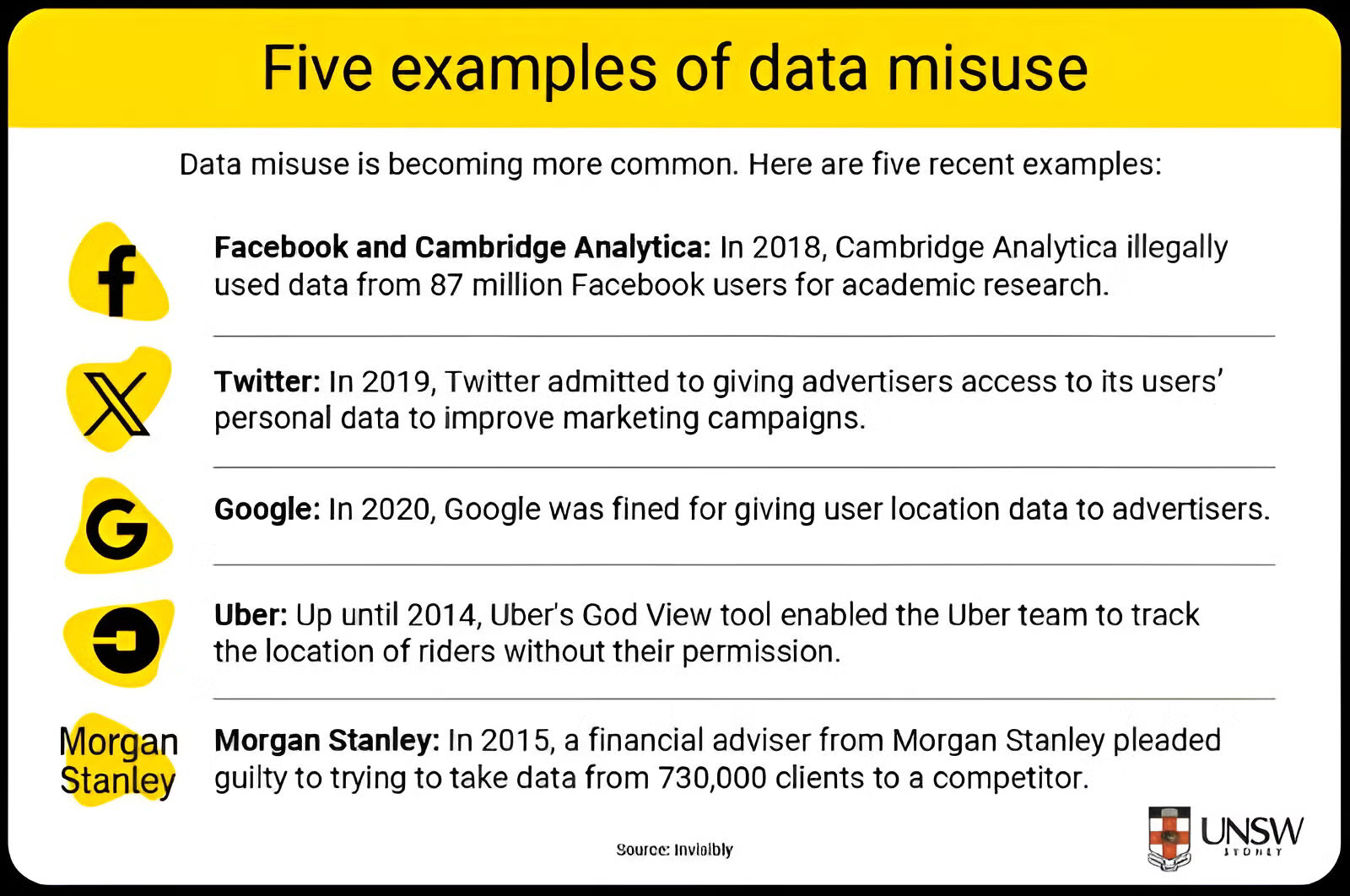In the digital age, data has been hailed as the new oil, a resource that drives innovation, efficiency and progress across industries. However, like oil, the proliferation of data comes with a pressing concern: data ethics. Data ethics refers to the moral considerations surrounding data collection, analysis and use.
In Australia, companies are increasingly collecting and using data as part of their regular operations. However, this fact is concerning to most Australians. Recent research shows that a whopping 84 per cent of Australians want more control over their data, citing data breaches as their number one privacy concern.
It’s critical to understand the guiding principles behind the ethics of data collection and use, as well as data’s significance in contemporary society.
In this article, we’ll dive into what aspiring data professionals need to know about the landscape of data ethics in Australia, including data ethics frameworks and examples of ethical data practices across different sectors.
What are data ethics?
Data ethics refers to the moral principles and guidelines that govern the ethics of data collection, processing and use. In particular, they address the ethical considerations arising from the increasingly pervasive role of data in various aspects of modern life.
Data ethics encompass a broad range of concerns, including privacy, consent, transparency, fairness and accountability. This involves balancing the potential benefits of data use with the protection of individual rights and societal values.
Key aspects of data ethics include:
- respecting individual rights to privacy and autonomy
- obtaining informed consent for data collection and use
- being transparent about data practices
- mitigating the risk of harm or discrimination
At its core, data ethics provide guidelines for navigating the dilemmas posed by data collection, analysis and dissemination in a rapidly evolving technological landscape. They aim to ensure that data-driven practices are conducted in a responsible and socially beneficial manner. They emphasise the importance of upholding ethical standards to promote trust, fairness and integrity in data-driven decision-making processes.
Why are data ethics important?
Data ethics have been becoming increasingly important in Australia in recent years.
Big data ethics can be especially critical due to the scale, scope and potential impact of data-driven processes. The term ‘big data’ goes beyond simply more of the same information. It refers to vast data sets collected from diverse sources, often characterised by three key attributes: high volume, velocity and variety.
Typically, big data is mixed, unstructured and accumulating so rapidly that normal data manipulation techniques (such as Microsoft Excel or SAP Crystal Reports) can’t make sense of it.
Here are five reasons why data ethics are so important in the ethical collection of data and the use of big data.
1. Protection of individual rights
Big data often involves the collection and analysis of massive amounts of personal information. Without robust ethical guidelines, there’s a risk of infringing upon individual rights to privacy, autonomy and dignity. Ethical data practices ensure that individuals have control over their data and are protected from potential misuse or abuse.
2. Mitigation of bias and discrimination
Data analytics can inadvertently perpetuate biases and reinforce existing inequalities in big data and general data collection. Unethical data practices, such as biased algorithms or discriminatory profiling, may result in unfair treatment or discrimination against certain groups.
By adhering to ethical principles, organisations can mitigate bias, promote fairness and strive for equitable outcomes in data-driven decision-making processes.
3. Enhancement of trust and transparency
Trust is paramount in the use of all data, mainly when it involves sensitive information or significant decisions. Ethical data practices, such as transparency in data collection methods and clear communication of data use policies, foster trust between data providers, data users and the broader community.
Transparency builds confidence in data processes and ensures accountability for the consequences of data-driven decisions.
4. Safeguarding against harm
Data has the potential to generate significant societal benefits, but it also carries inherent risks. Ethical data practices help mitigate the risks of harm, including privacy breaches, identity theft or unintended consequences of data analysis.
By prioritising ethical considerations, organisations can proactively identify and address potential risks, thereby safeguarding individuals and communities from harm.
5. Promoting social responsibility
In an increasingly interconnected world, the ethical use of data extends beyond individual organisations to encompass broader societal impacts. Ethical data practices promote social responsibility by considering the broader implications of data-driven decisions on diverse stakeholders, communities and society.
By aligning data practices with ethical principles, organisations can contribute to positive social outcomes and sustainable development.
Principles of ethical data collection and management
Ethical data management, including big data ethics, is guided by a set of principles aimed at ensuring the responsible and respectful handling of data. These principles are aspirational; at this point, they aren’t enforceable and many organisations choose not to follow them.
These principles help organisations navigate the complex landscape of data use while upholding individual rights, promoting fairness and fostering trust. Here are the key principles of ethical data management.
Consent
Consent says that organisations should seek explicit permission from individuals before collecting their personal data. Consent should be informed, freely given and revocable, empowering individuals to control their data and its use.
Fairness
Fairness means that data should be used in ways that don’t perpetuate biases, discriminate or cause harm. Ethical data management strives to ensure equitable treatment for all individuals and mitigate the risks of bias in data-driven decision-making processes.
Intention
Organisations should have good intentions regarding data use. Their data use should serve societal interests and not disadvantage individuals. In practice, a considerable amount of data is used for purposes that don’t necessarily serve higher interests – for example, to target potential users of products and services.
Ethical data management entails aligning data practices with societal values and prioritising the common good over individual interests or organisational goals.
Integrity
Organisations should act with integrity when collecting data; that is, they should ensure that the data they collect is accurate and reliable. Ethical data management prohibits the misrepresentation of facts or the use of data to justify unethical decisions. Maintaining data integrity is essential for building trust and credibility in data-driven processes.
Stewardship
Stewardship means data collection and management should occur in a protected and secure environment. Ethical data management emphasises the importance of safeguarding data against unauthorised access, disclosure or misuse, thereby preserving data’s confidentiality, integrity and availability.
Unethical data use
Despite a proliferation of principles, best practices and attempts at governance, data isn’t always managed to a high standard.
Unethical data practices can lead to many dire consequences and it’s important to understand the risks as well as examine some examples of unethical data use.
Risks of unethical data use
The consequences of unethical data practices can be profound, posing risks to individuals, organisations and society. Below are examples of unethical data use.
Privacy violations
Unauthorised data collection or sharing can compromise individual privacy, leading to breaches of confidentiality and potential harm.
Discriminatory algorithms
Biased algorithms or discriminatory data practices can perpetuate inequality, exacerbating disparities in access, opportunity and treatment.
Surveillance capitalism
Tech companies’ exploitive data practices can result in the commodification of personal data, fueling surveillance capitalism and eroding democratic norms.
Manipulative marketing
Unethical data-driven marketing techniques, such as microtargeting or psychological profiling, can manipulate consumer behaviour and undermine autonomy.
Social manipulation
Malicious actors may exploit data for social manipulation, spreading misinformation, polarising discourse or influencing elections.
Examples of unethical data use
Unfortunately, there are examples of unethical data use every day. Unethical data use represents a breach of trust and privacy with significant implications for individuals and society. Several prominent examples highlight the risks and consequences associated with unethical data practices.
Facebook and Cambridge Analytica
In 2018, Cambridge Analytica infamously obtained data from 87 million Facebook users without their consent, exploiting it for political profiling and targeting. This example showcases the dangers of unauthorised data access and misuse.
In 2019, Twitter admitted that it had provided advertisers access to users’ personal data, including their phone numbers and email addresses, without proper consent, raising concerns about privacy violations and exploitation for commercial purposes.
In 2020, Google faced regulatory scrutiny and fines for unlawfully sharing user location data with advertisers, highlighting the risks of data misuse and privacy breaches within tech giants.
Uber
Until 2014, Uber’s God View tool allowed employees to track the real-time locations of riders without their explicit consent, compromising user privacy and trust in the company’s data handling practices.
Morgan Stanley
In 2015, a Morgan Stanley financial adviser pleaded guilty to attempting to steal data from 730,000 clients for the benefit of a competitor, underscoring the risks of insider data breaches and corporate espionage.
Data ethics in Australia
Australia, like many other countries, grapples with the challenges and complexities of data ethics in the digital era. While the country has made strides in data regulation and governance, notable issues and concerns persist.
Data ethics Australia: Historical context and current state
Historically, Australia has implemented various legislative and regulatory measures to address data privacy and security concerns. The Privacy Act of 1988 serves as the cornerstone of data protection legislation, outlining the principles for the fair handling of personal information by private and public sector entities.
Despite regulatory efforts, Australia has faced persistent challenges in balancing data innovation with privacy protection. High-profile data breaches, such as the 2016 Census incident and the 2018 Facebook-Cambridge Analytica scandal, have underscored the need for stronger data ethics frameworks and enforcement mechanisms.
In response to growing concerns, Australia has taken steps to strengthen data governance and promote ethical data practices. Initiatives such as Consumer Data Right (CDR) aim to empower individuals with greater control over their data and facilitate data sharing in regulated sectors, such as banking and telecommunications.
The Australian government has also released guidelines on artificial intelligence (AI) ethics, emphasising transparency, fairness and accountability in AI development and deployment.
Despite progress, challenges persist, including the need for enhanced data transparency, accountability and cross-sectoral collaboration. As Australia navigates the evolving data landscape, addressing these challenges will be essential to fostering public trust, promoting innovation, and ensuring responsible and ethical use of data across diverse sectors and industries.
Data ethics examples in Australia
Across diverse industries and domains, Australian organisations are pioneering ethical data practices and setting precedents for responsible data stewardship. Here are several notable examples of data ethics in Australia.
Health care
The Royal Children’s Hospital in Melbourne adheres to ethical guidelines for paediatric data research, prioritising patient privacy, consent and data security. By upholding ethical standards, the hospital advances medical knowledge and improves treatment outcomes while safeguarding patient rights.
Finance
The Commonwealth Bank of Australia (CommBank) employs ethical AI algorithms to combat financial fraud. By doing so, the bank uses AI in a way that ensures transparency and customer trust in its data-driven risk management practices.
By prioritising ethical considerations, the bank enhances security and integrity in financial transactions while maintaining customer confidence.
Education
Education departments in Australia, such as the Queensland Department of Education, have developed data literacy and decision-making frameworks to support student wellbeing and learning. These highlight the importance and benefits of data in education, as well as best practice guidelines for ethical data use.
Government
The Australian Bureau of Statistics (ABS) upholds ethical data principles in its data collection and dissemination activities. These principles promote transparency, integrity and public trust in official statistics.
By adhering to ethical standards, the ABS enhances data quality and reliability for informed decision-making.
Tech industry
Atlassian, an Australian software company, integrates ethics into its AI development processes. This process helps ensure fairness, accountability and transparency in algorithmic decision-making.
By prioritising ethical AI practices, Atlassian promotes responsible innovation and builds trust with customers and stakeholders.
Data ethics framework
Beyond the principles that govern data ethics, a robust data ethics framework that governs ethical data collection and use is essential to ensure that data-driven practices adhere to ethical principles, respect individual rights and promote societal well-being. While principles are aspirational ideals that experts believe organisations should adhere to, a framework is a more concrete set of rules that may be enforceable in the future.
Such a framework should encompass several key elements to guide organisations in navigating the complex landscape of data ethics.
Transparency
Organisations should always be transparent about their data collection processes, purposes and methods.
Clear and accessible information should be provided to individuals regarding what data is being collected, how it’ll be used and who’ll have access to it. Transparency fosters trust and empowers individuals to make informed decisions about their data.
Organisations should also provide mechanisms for individuals to withdraw their consent easily at any time.
Purpose limitation
Data should be collected and used only for legitimate purposes and not further processed in a manner incompatible with those purposes. Organisations should clearly define the purposes for which data is collected and ensure that data use aligns with those purposes.
Data minimisation
Organisations should collect and retain only the minimum data necessary for the intended purpose. Data minimisation helps reduce privacy risks and mitigates potential misuse or unauthorised access. Unnecessary or sensitive data should be avoided unless there’s a clear justification for its collection.
Security
Organisations have a responsibility to implement appropriate measures to protect data against unauthorised actions, including access, alteration, destruction or disclosure. This includes encryption, access controls, regular security audits and employee training on data security best practices.
Organisations should also anonymise data to protect individual privacy. This is especially relevant when data is disseminated publicly or shared widely.
Accuracy and quality
Organisations should strive to maintain the accuracy, completeness and reliability of data throughout its life cycle. Data should be kept up to date and free from errors or inconsistencies to ensure that decisions based on the data are reliable and trustworthy.
Accountability
Organisations should establish mechanisms for accountability and oversight to ensure compliance with ethical data practices. This includes designating responsibility for data governance, conducting regular audits and providing avenues for individuals to address concerns or complaints about data use.
Data ethics: Critical for everyone’s future
Data ethics constitute a foundational pillar of responsible data governance, encompassing principles of transparency, fairness, privacy, consent and accountability.
As data-driven technologies continue to reshape society, the imperative for ethical data practices becomes increasingly pronounced.
By embracing ethical frameworks, fostering a culture of responsibility and showcasing exemplars of ethical data stewardship, organisations and data professionals can ensure that data is used in the right way, now and in the future.
If you’re considering a career in data science, UNSW's online Master of Data Science provides an excellent path forward. Depending on your interests and goals, you can specialise in areas such as machine learning, database systems, or statistics.
Gain insights into the thriving world of data science by speaking with one of our enrolment advisors at 1300 974 990.






